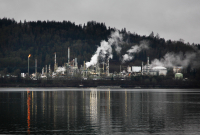Support strong Canadian climate journalism for 2025
An east-end Montreal school board says that all of the students and staff are safe and sound after officials were forced to call in emergency crews to respond to a mysterious odour at an elementary school. The sulphur-like odour was reportedly prompted by an incident at a nearby Suncor refinery.
Officials at the elementary school on the eastern tip of Montreal Island, école Saint-Octave, said that firefighters and paramedics responded rapidly after about 20 students and one teacher reported feeling sick.
"All students are safe," the Pointe-de-l'île school board said in a statement posted on its Facebook page on Tuesday afternoon. "Emergency crews have just left the school."
The school board noted that it was told by local utility and public safety officials that the odour was not originating from inside the school, but likely from one of the refineries in the area. The school board also said in its statement that there were no signs carbon monoxide poisoning.
At least two media outlets, the CBC and La Presse, reported that the source of the problem was an incident at the nearby Suncor refinery.
Urgence-Environnement, a division of the Quebec Environment Department, told Radio-Canada in an email that the odour was coming from a recent shipment of crude oil in a tank at the Suncor facility.
Suncor Energy spokesman Michael Lawrence was unable to confirm whether the company was responsible for the leak.
“Early this afternoon we responded to reports of odour issues in the area of our Montreal refinery, in conjunction with reports of children at a nearby school reporting odours," he told National Observer.
“We immediately initiated our response plan and attempted to determine the source of the odour. As part of this, we are monitoring air quality with the permanent sensors we have in place. We also deployed operators with portable air monitoring sensors.”
“Our initial readings indicate that we are operating well within regulatory limits, but regardless, whether or not we’re the source of the odour, we’re obviously very concerned with the situation and taking it seriously. Finally, we notified local authorities and are working with the Montreal fire department to monitor air quality.”
Suncor has recently noted on its website that it's determined to minimize odours from its operations and be a "good neighbour" to Montreal by exploring new technologies.
"Odours from our refinery are not toxic or harmful according to health standards," the company said in a note posted on its site, dated in November 2018. "Odour perceptions can vary from one person to another. Yet, at Suncor, we take every measure possible to reduce the nuisances caused to our neighbours."
The company has also recently experienced what it described as "operational issues" at its Edmonton refinery a few days earlier. It had warned neighbours in that area that they might "notice increased flaring, noise and odour levels."
"We apologize for any inconvenience this may cause and thank you for your patience," Suncor said in a tweet posted on Jan. 17, 2019.
The incident comes a few months after an investigation by Global News, the Toronto Star and National Observer, found that pollution from Canadian refineries was much higher than it was from comparable facilities in the United States.
At the time, an industry spokesman acknowledged that Canadian companies "haven't done so well."






Comments
Suncor: "We apologize for any inconvenience this may cause and thank you for your patience."
The National Observer should not follow the industry's practice of talking about "odours" as a euphemism for pollution, in reports on gas flaring, emissions, and leaks.
E.g., emissions from Baytex CHOPS facilities that drove farm families from their homes around Peace River.
"Oilpatch odours in northwestern Alberta still pungent, years after inquiry"
"Bad air: Oilpatch odours return to northwestern Alberta despite fix attempts"
"Lawyer asks court to shut down oilsands plant releasing harmful odours"
"A cocktail of chemicals’: Alberta farmers face off with energy firms over odour from heavy oilfields"
"Leaders vow to tackle Fort McKay air quality, odour complaints"
AB Environment typically minimizes health concerns by calling even potentially deadly hydrogen sulphide leaks an "odour nuisance". To AB Environment, every flare, spill, and leak is merely an "odour problem".
The terminology seems to originate with industry public relations and govt, and is then copied by stenographers posing as journalists. "Nothing to see here. Move along."
This industry euphemism is noxious, because it reduces harmful emissions to a "bad smell" that can't really hurt you.
Of course, emissions like hydrogen sulphide can make people sick; cause chronic illness; or kill people, livestock, and wildlife outright.